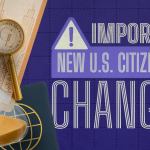What You Need to Know About Denaturalization
For many immigrants, becoming a U.S. citizen is the final step in a long journey. It represents safety, stability, and a new beginning. But in 2025, a growing number of naturalized citizens are asking a painful question:
“Can I lose my citizenship?”
Here’s what’s happening—and what you need to know to protect yourself.
What Is Denaturalization?
Denaturalization is the legal process by which the U.S. government can revoke your citizenship if you were not born in the United States and became a citizen through naturalization. It was once rare. Now, it’s becoming more common.
Why Is It Back in the Spotlight?
In June 2025, the Department of Justice (DOJ) released a memo stating that denaturalization is now one of its top enforcement priorities. The DOJ is giving attorneys wide authority to pursue denaturalization against people who:
- Committed certain crimes (like human trafficking, child abuse, or fraud)
- Lied or omitted facts during the naturalization process
- Are considered national security threats
In some cases, even small procedural errors or non-disclosure of past offenses could trigger a denaturalization case.
Why Legal Experts Are Worried
Under the new policy, most denaturalization cases will be handled in civil court—which means:
- You are not guaranteed a government-paid attorney
- The government needs less evidence to win the case
- Proceedings are faster and less protective of your rights
Immigration lawyers and civil rights groups warn this opens the door to two classes of citizens: those born in the U.S., and those who can lose their citizenship.
And while the DOJ says it will focus on serious crimes, legal analysts worry that this could affect people who made minor mistakes, or even no mistakes at all.
A Real-Life Example
In June 2025, a federal judge revoked the citizenship of a U.S. military veteran originally from the U.K., after it was revealed that they failed to disclose past criminal conduct during naturalization. They renounced their British citizenship to become American, and are now stateless.
This case set a troubling precedent—because it shows that even past behavior, if not disclosed properly, can result in losing U.S. citizenship years later.
What Could This Mean for Families?
If a parent is denaturalized, there’s concern about how this might affect their children—especially those who gained citizenship through their parent. The DOJ has not yet clarified how these situations will be handled.
What Should You Do?
- Review your naturalization records: Make sure everything was accurate and complete
- If you have a past criminal record, even if it was minor or expunged, talk to a trusted immigration attorney
- Don’t panic—get informed: Knowledge is your best protection
At The Grande Law Firm, we believe citizenship should be permanent—not conditional. We’re here to help you understand your rights, assess your situation, and move forward with confidence.
📞 Questions about your case or your naturalization history? Call us at +1 (310) 905-8701.
Disclaimer: This post is for general informational purposes only and does not constitute legal advice or establish an attorney-client relationship.





